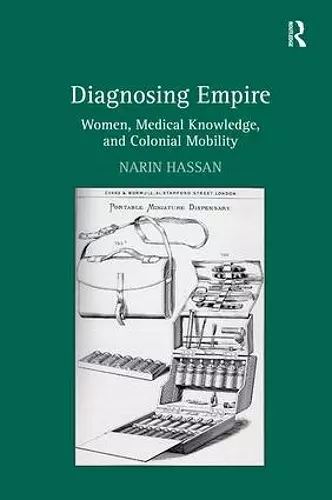Diagnosing Empire
Women, Medical Knowledge, and Colonial Mobility
Format:Hardback
Publisher:Taylor & Francis Ltd
Published:28th Jun '11
Currently unavailable, and unfortunately no date known when it will be back

Examining the emerging figure of the woman doctor and her relationship to empire in Victorian culture, Narin Hassan traces both amateur and professional 'doctoring' by British women travelers in colonial India and the Middle East. Hassan sets the scene by offering examples from Victorian novels that reveal the rise of the woman doctor as a fictional trope. Similarly, medical advice manuals by Victorian doctors aimed at families traveling overseas emphasized how women should maintain and manage healthy bodies in colonial locales. For Lucie Duff Gordon, Isabel Burton, Anna Leonowens, among others, doctoring natives secured them access to their private lives and cultural traditions. Medical texts and travel guides produced by practicing women doctors like Mary Scharlieb illustrate the relationship between medical progress and colonialism. They also helped support women's medical education in Britain and the colonies of India and the Middle East. Colonial subjects themselves produced texts in response to colonial and medical reform, and Hassan shows that a number of "New" Indian women, including Krupabai Satthianadhan, participated actively in the public sphere through their involvement in health reform. In her epilogue, Hassan considers the continuing tradition of women's autobiographical narrative inspired by travel and medical knowledge, showing that in the twentieth- and twenty-first century memoirs of South Asian and Middle Eastern women doctors, the problem of the "Woman Question" as shaped by medical discourses endures.
'Diagnosing Empire treats medical culture as one of the traveling idioms through which a variety of observers, both metropolitan and "native," apprehended the modern imperial world. Reading an array of objects - from medical texts to medical "cases" of all kinds - Hassan reveals the affinities between clinical knowledge, gendered identity and colonial power. Keen to link histories of women's writing with mobility and the rise of the professional female doctor, she offers a unique and readable account of medicine's interpretive power as well as its capacity to carry social and cultural ways of knowing in the pathways of empire's global circuitry.' Antoinette Burton, University of Illinois at Urbana-Champaign, USA 'Overall, the book brings together several travel narratives by British women who travelled to non-western countries as part of an entourage or later, professionally, on their own and who practised medicine using western therapeutics and tools on non-western communities... this book will be a useful reference for those interested in nineteenth-century medical travel literature.' Social History of Medicine ’...make[s] a significant contribution to the history of medicine, western science, and colonialism.’ Canadian Bulletin of Medical History 'By focusing on the textual and literary analysis of selected women’s writings and documenting their participation in the projects of Western medicine and empire, Narin Hassan offers a unique vantage point for understanding the broader history of imperial and colonial medicine.' Bulletin of the History of Medicine
ISBN: 9781409426110
Dimensions: unknown
Weight: 408g
142 pages